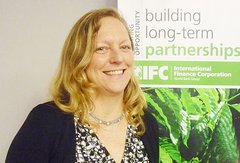For men and women, roads are not the same. Infrastructure, such as streets, transit systems, and cell phone networks, makes a significantly bigger difference to a woman's life and work than a man's.
This often overlooked fact is critical given that women now make up 40% of the global labour force and more than half of the world's university students.
The East Asia Pacific in particular needs significant infrastructure investments to unlock the contributions of both men and women to the region's dynamic economies — currently it suffers from an annual gap of $1 trillion (32 trillion baht) in infrastructure financing.

Finkelston: Improving infrastructure has a disproportionately positive impact on women.
However, Asia Pacific is specifically failing to capture the full potential of women's impact on society because of unsafe, insufficient and inadequate infrastructure. Safer, less crowded and more cost-effective roads that connect women with where they need to be is one way of making improvements.
In East Asia Pacific, output per worker could be as much as 7-18% higher across a range of countries if female workers were to work in the same sectors, types of jobs, and activities as men, with the same access to productive resources. Given this, investing in improving the design and delivery of urban, rural and financial infrastructure to equip women to play a greater role in productivity is a pressing development imperative.
Transportation, energy, sanitation and other hard infrastructure designed with women in mind means removing the time, cost and access constraints that hold women back. Impediments to using public transportation, for example, are different for women and men. Studies show that women rank personal security and transportation costs higher than men who rate speed as a number one issue.
Women will make important life choices — "Can I work outside the home? Where? Can I get my children to school?" — based on security and travel costs. Decisions such as these can have important economic implications if a lower paid job trumps a higher paid one just because a woman feels getting to the former would be safer.
In cities especially, women make more trips during off-peak work hours, connecting many stops in one trip in what's known as "trip-chaining" action. Women often start the day by dropping off children at school, travelling to work and stopping at the pharmacy, or the supermarket, on their way home after work. Managing a juggling act of work and family responsibilities means women, in particular, are time-poor, so navigating transportation has to be made easy and accessible.
Gender smart infrastructure begins with the consultation process. Women openly discussing their concerns about a project reveals gender-specific needs and ways of integrating these into project designs. For the Metro Rail Transit system in Vietnam's commercial capital, Ho Chi Minh City, an analysis was done to map male and female transportation needs, patterns and constraints, safety and security issues, and willingness to pay.
Consultations were carried out with women, which then helped the transit line organise a gender-sensitive infrastructure, including women-only carriages, child seating, storage for prams, exclusive waiting rooms for women, well-maintained toilets, appropriate lighting and space for women-owned businesses.
Making it easier for women to travel around the Vietnamese metropolis will induce them to make more journeys, thereby helping to boost the city's economy. As Vietnam's economy strengthens, this is a powerful way of increasing women's engagement.
In Asia Pacific's rural regions, road safety can be a huge issue for women travelling long distances. In one public consultation about a local highway in Papua New Guinea, women were asked about the journeys they made to sell their produce at market. These trips were often uncomfortable and unprofitable.
The women reported enduring hours on mountainous roads, at the crack of dawn, crowded beside men in public vehicles, just to take their produce to market. The discomfort and inconvenience was not even rewarded at the end of the day.
All women consulted said they had been robbed of their profits on buses or by the roadside. Improving the quality of roads and street lighting and providing more buses to ease the crowding would incentivise women to travel to market more frequently and safely. These are simple solutions that would empower women to sell more and return with the profits in their own — not someone else's — pockets.
In China, the intelligent use of big data could bring millions of unbanked women into a financial system from which they were formerly excluded.
Technology giants, like Alibaba and Tencent, are filling a niche for women micro-entrepreneurs with aspirations to grow their business. They are built around making judgement calls on their clients' creditworthiness by referring to historical patterns of commercial online activities to predict future financial behaviour.
Ant Credit, related to the Alibaba Group and supported by IFC and Goldman Sachs' 10,000 Women Initiative, interviews women micro-entrepreneurs online, which eliminates the need for them to travel distances, perhaps by crowded and costly transportation, to branch offices.
The company is helping women grow their textile, shopping and other businesses from a virtual zero baseline to, in some cases, annual growth of several million US dollars. The possibilities for small business to expand are enormous as financial services in China extend their remit to serve new demographics, such as rural women and the country's growing consumer class.
In sum, improving infrastructure has a disproportionately positive impact on women. It enhances their safety and security, renders them more mobile, saves time, makes them more productive and hence significantly improves a country's overall development.
Gender-smart infrastructure has to be front and centre on Asia Pacific's development agenda.
Karin Finkelston is Vice President Global Partnerships for IFC, a member of the World Bank Group and the largest global development institution focused exclusively on the private sector.